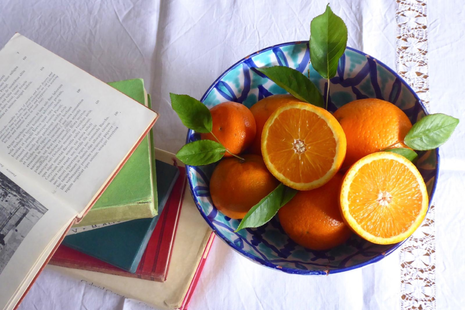Is Wendy Cope’s poetry worth the social media craze?
Rachel Jones unpeels TikTok poetry, and asks why everyone is obsessed with ‘The Orange’

An anomaly amongst the usual circus of dances, memes, and sound bites, Wendy Cope’s ‘The Orange’ recently went viral on social media. The poem is an undoubtedly striking reflection on friendship, human connection, and the small pleasures in life, but what is it exactly that makes it so appealing to an online audience? ‘The Orange’ takes a banal image, so commonplace that it is almost bathetic, and imbues it with significance that means it shines brightly across the poem. This treatment of the mundane fits in perfectly with that subsection of Gen Z that, disillusioned by millennial hustle culture, is set on romanticising the quiet everyday moments that bring joy to their lives.
TikTok is full of morning routine vlogs, short rituals like coffee brewing or evening walks, and trends that encourage the viewer to slow down and reconnect with ordinary pleasures – like the recent “almost forgot that this is the whole point” videos. It is not difficult, then, to see why ‘The Orange’ caught the eye of social media – not only does it make such routine ephemera as “a huge orange”, “the shopping” and “a walk in the park” repositories for such sentiments as “peace and contentment” or “I love you. I’m glad I exist”, but it is also as pictorially engaging as a well-curated Instagram post or TikTok montage. The poem asserts that anything is worthy of being the subject of art. Such accessibility is underpinned by paratactic sentences and pared-back language. There is, for example, only one word longer than two syllables, and each feels carefully, almost economically, weighed, making the poem palatable to a wide audience, especially on apps that cater to the masses and allow anyone to become a creator. Cope challenges common preconceived notions of poetry as necessarily mystifying or oblique in a refreshing way.
“The poem asserts that anything is worthy of being the subject of art”
Having encountered ‘The Orange’ during its online vogue, I got myself a paperback copy of one of Cope’s poetry collections, Two Cures for Love: Selected Poems 1979-2006, to see whether TikTok likes could really be trusted as a metric for good poetry. Some of the poems exemplify Cope’s speciality in coaxing verse out of the unremarkable, and do so with a lovely tender lyricism – ‘On a Train’, for example, ends with “Long, radiant minutes, / your hand in my hand, / still warm, still warm”, working by its impression of light and soft, insistent repetition. Others in the collection address this philosophy more directly: “I aspire / To go on and on being boring” declares ‘Being Boring’, matter-of-factly. This frankness is often the source of a lot of sharp-tongued comedy: at one point she compares “bloody men” to buses which keep you waiting for eons, and then appear together all at once. Adding a political twist to this acerbic wit, she effectively ironises the Church of England’s treatment of women: “Sister, fetch the fatted calf, and we’ll prepare a feast: / You can’t become a bishop but you can become a priest.”
“Her poetry is suited to internet fame for its ability to speak candidly on the daily clutter of our lives”
But the poems don’t function by blunt forthrightness only. Cope has a canny appreciation for the mechanisms of traditional poetic craft and freely inverts, reworks, and parodies them. Her Shakespearan sonnet, ‘The Sitter’ is a clever take on the Petrarchan ‘blazon’ (a poetic anatomising of the female love-object) – the power dynamic shifts and the speaker finds themself being looked back at disconcertingly, while the clichés of love poetry become such lines as “Depressed and disagreeable and fat – / That’s how she saw me”. ‘Strugnell’s Sonnets’ refresh the form with references to “cornflake packets” and “the expense of spirits”, while ‘Nine-line Triolet’ reflects on the efficacy of linguistic and poetic conventions as vehicles for expression.
Cope’s poems toe a careful line between witty and obvious – a lot of the time she pulls off the balancing act, but at other times she verges into a directness that is uninspiring rather than original. ‘Seeing You’, for example, runs "Seeing you will make me sad, / I want to do it anyway", which feels to belong more to a late-night notes app entry rather than a published poem, and halfway through throws in a reference to mortality ("But we will both be dead one day") that is more ridiculous than poignant. Poetry, as Wendy Cope has proved elsewhere, doesn’t have to be complex to be effective, but I think this is still dependent on producing something that speaks, at least to some degree, to the act of creating, whether in the way it uses poetic form, images, linguistic features, or in the way it mixes associations (as Cope does elsewhere in meshing the banal with the profound).
A lot of things that go viral are completely nonsensical: I can say truthfully that I don’t think Wendy Cope and her orange belong to that category. Her poetry is suited to internet fame for its ability to speak candidly on the daily clutter of our lives and dissect it with a witty proverb or striking lyricism. She is refreshingly frank, sometimes hackneyed, always acute. Whether read on a TikTok carousel or elsewhere, when it comes to conventional ideas of what it means to translate the world into poetry, she refuses to do the expected.
 News / Judge Business School advisor resigns over Epstein and Andrew links18 February 2026
News / Judge Business School advisor resigns over Epstein and Andrew links18 February 2026 News / Hundreds of Cambridge academics demand vote on fate of vet course20 February 2026
News / Hundreds of Cambridge academics demand vote on fate of vet course20 February 2026 News / Petition demands University reverse decision on vegan menu20 February 2026
News / Petition demands University reverse decision on vegan menu20 February 2026 News / CUCA members attend Reform rally in London20 February 2026
News / CUCA members attend Reform rally in London20 February 2026 News / Caius students fail to pass Pride flag proposal20 February 2026
News / Caius students fail to pass Pride flag proposal20 February 2026










